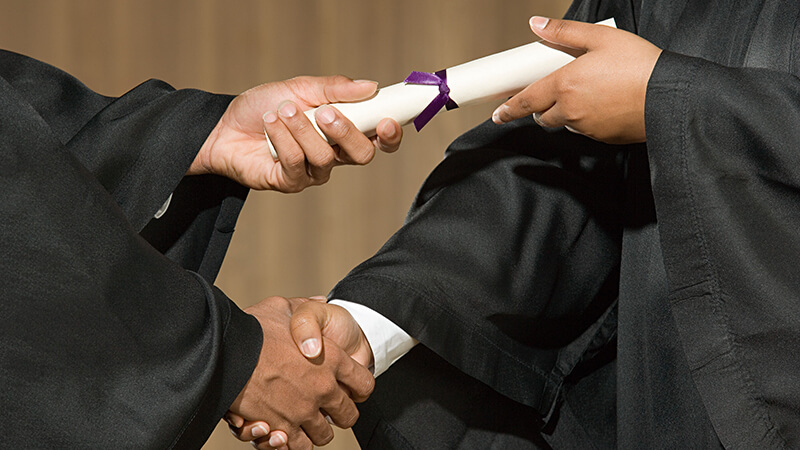New numbers for Black Americans eager to improve their lives with college degrees are alarming: Only 34 percent hold degrees, and half four-year colleges within six years. Worse yet, their college enrollment numbers are steeply declining, down another 30,000 this past fall.
A new Gallup-Lumina Foundation poll tells us why. It shows how discrimination often derails learners’ dreams of better-paying jobs or promotions with degrees and credentials.
Overall, the poll found that one in five Black postsecondary students say they “frequently” or “occasionally” feel discriminated against at college—compared to the 15 percent reported for their peers. Black students were likelier to say they felt disrespected or unsafe in less diverse student populations.
But in a concerning trend, the survey found higher reports of discrimination in certain academic programs that are increasingly popular with Black students:
- While Black learners make up a large share of students in private for-profit schools, one-third say they experience discrimination frequently or occasionally—a much higher portion than at private, not-for-profit schools or public colleges.
- One-third also say they frequently or occasionally feel discriminated against in short-term credential programs, including those seeking certificates or professional certifications. This discrimination rate is twice as high as their reports of discrimination in associate and bachelor’s degree programs.
These fast-track credential programs are often popular options for students who juggle family responsibilities and work full- or part-time to pay the high costs of college.
The poll also found that more than one in three Black bachelor’s degree students have major work and family responsibilities, about twice the rate for all other bachelor’s students. Of these students, almost half have considered stopping out.
Enrollment, attainment gaps widen
So, it’s no surprise that college enrollment for Black students is falling fast:
- At public four-year colleges, between 2017 and the fall of 2022, Black enrollment dropped by nearly 90,000 students. At public two-year community colleges over that same period, the decline has been even steeper year over year, down more than 200,000 students.
- Many who do enroll end up “stopping out.” At last count, 39 million Americans had done so.
- As a result, the gaps among races in earning degrees Updated numbers on Lumina’s Stronger Nation website show only 34.2 percent of Black adults have college degrees, compared to 45.7 percent for the nation. Those gaps carry through to jobs and promotions.
Redressing these imbalances is more urgent than ever, as most new jobs require education beyond high school, and most good-paying jobs require a college degree.
Here’s the bottom line
With these new data in hand, our next steps are clear. Short-term credential programs need more safeguards and oversight to root out systemic discrimination. Advocates have called for greater accountability measures to prevent for-profit colleges from targeting minority communities with inferior program quality and predatory lending practices.
And at schools with fewer students of color, educators, students, and diversity officers need to partner to ensure their culture is safe and inclusive.
https://www.gallup.com/analytics/468986/state-of-higher-education.aspx Meanwhile, we can help students juggle competing priorities by adding more online courses, counselors, and evening faculty hours. Other essential support includes campus programs and emergency funds.
The bottom line is this: College should be a welcoming haven for all learners, free of racism. It’s urgent that we reverse these trends, help Black students get back to their studies – and build a brighter future for us all through the power of learning.
Related links:
-
- Black College Students Have Much More To Do Than Study, Research Shows | BET | Feb. 10, 2023
- ‘Exceptional’ barriers stop Black students from succeeding in higher ed | EdSource | Feb. 10, 2023
- High costs and discrimination: US study details obstacles for Black students | The Guardian | Feb. 10, 2023
- Survey Details Obstacles to Black Student Attainment | Inside Higher Ed | Feb. 10, 2023
- Discrimination and caretaking contribute to lower college completion rate for Black students | NBC News | Feb. 10, 2023
- Black students more likely to be balancing life responsibilities beyond coursework: Gallup | The Hill | Feb. 9, 2023
- Why Nearly Half of Black Students Have Considered Stopping College | The 74 | Feb. 9, 2023
- 1 in 5 Black students feel discriminated against in their postsecondary programs | Higher Ed Dive | Feb. 9, 2023
- For Black Students, 2 Obstacles to Graduation Loom Large: Discrimination and Responsibilities | The Chronicle | Feb. 9, 2023
